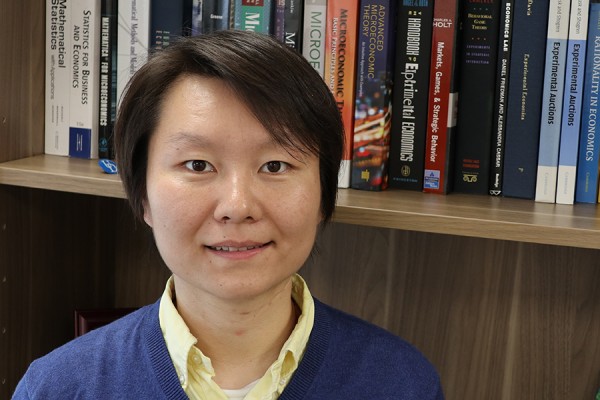 Public resistance can scupper plans to use recycled wastewater to conserve freshwater, says economics professor Tongzhe Li.
Public resistance can scupper plans to use recycled wastewater to conserve freshwater, says economics professor Tongzhe Li.
Members of the Windsor-Detroit community will soon have a chance to tell economics professor Tongzhe Li how they feel about using recycled wastewater to conserve freshwater.
Purifying wastewater for reuse is an environmentally prudent solution to water scarcity, especially in heavy water-usage productions like commercial crop irrigation. But, Dr. Li says, the marketplace cannot succeed if the public perception is too negative.
“Water is a global issue and the world is rapidly innovating recycling technologies to address water scarcity,” she says. “But no technological innovation can make a difference to our economy without consumer acceptance for products made with, or grown using, recycled water.”
Li won the 2017 Sylvia Lane Mentorship Fellowship, established by the Committee on Women in Agricultural Economics, as well as recently receiving a bridge grant funded by the US Department of Agriculture to collaborate with the University of Maryland, the University of Delaware, and the University of Arizona. These opportunities allow her to continue researching into the public perception of using recycled wastewater, and will specifically focus on residents who live near an abundance of natural water, like the Great Lakes.
“In locations where natural water is abundant, residents may have less financial incentive to conserve water. However, the same group may get a ‘warm glow effect’ when they think that conserving water helps others in need,” says Li.
The economist says that although reclaimed water helps conserve and is scientifically proven to be safe for irrigation, consumer acceptance tends to waver based on how its usage is framed. In her previous research, consumers generally showed a dislike to knowing their wine grapes were irrigated with recycled water.
“It is as much about how the information is framed, as it is about the knowledge itself,” says Li. ”By framing it in a positive light and explaining that recycled water helped the environment, people’s willingness to pay for such a product rose significantly, but when the information becomes technical or excessive, the willingness to pay dropped.”
Part of the research grant allows Li to hire two or three students to create a research team, who will help collect survey data from several North American sites, chosen based on water accessibility levels and water prices. In addition to Windsor and Detroit, they will poll residents in Montreal, mid-Atlantic states, and Phoenix, Arizona.
After Li assembles her research team, they will start actively recruiting residents to complete surveys.
